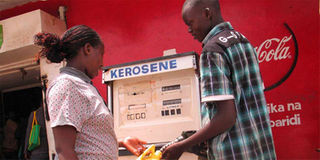Kerosene, charcoal prices rise most, hit poor homes

An attendant sells paraffin to a customer at a Nyeri petrol station. FILE PHOTO | NMG
What you need to know:
- Official data shows charcoal prices rose 70 per cent to Sh141 per a four-kilogramme tin in December—recording the highest price last year.
- Kerosene came in second with a 46 per cent to Sh106 a litre.
- The charcoal price surge is linked to a ban on logging while that of kerosene is attributed to tax increase targeted at discouraging unscrupulous traders from fuel adulteration.
Charcoal and Kerosene prices last year rose the most among goods used to calculate inflation, hurting the poor who use the commodities for lighting and cooking.
The Kenya National Bureau of Statistics (KNBS) data show charcoal prices rose 70 per cent to Sh141 per a four-kilogramme tin in December—recording the highest price last year.
Kerosene came in second with a 46 per cent to Sh106 a litre.
The charcoal price surge is linked to a ban on logging while that of kerosene is attributed to tax increase targeted at discouraging unscrupulous traders from fuel adulteration.
“Housing, water, electricity, gas and other fuels’ Index, increased by 0.07 per cent in December 2018 compared to November 2018,” said KNBS.
The government on February 24 suspended logging in public forests, triggering a sharp rise in timber and charcoal prices.
A four-kilogramme tin of charcoal retailed at an average of Sh83 before the ban.
In November, the government extended the anti-logging ban for a year in the push to boost forest cover — which has been diminishing in recent years and remains far below the UN minimum recommended level of 10 percent.
Higher kerosene tax hit poor homes that rely on the fuel to power cooking stoves and lanterns, along with small-time fishermen who use kerosene lamps for fishing
Kerosene prices shot past the Sh100 mark a litre following imposition of the Sh18 anti-adulteration levy. The commodity retailed at an average of Sh72 per litre in December 2017.
kerosene was priced at Sh20 below diesel before the imposition of the tax, encouraging rogue traders to mix paraffin with the motor fuel in search for higher profit margins.
Lower tax on kerosene was originally meant to cushion low-income households from high cost of living but profit-hungry traders turned it into a cash cow from sale of adulterated fuel.




